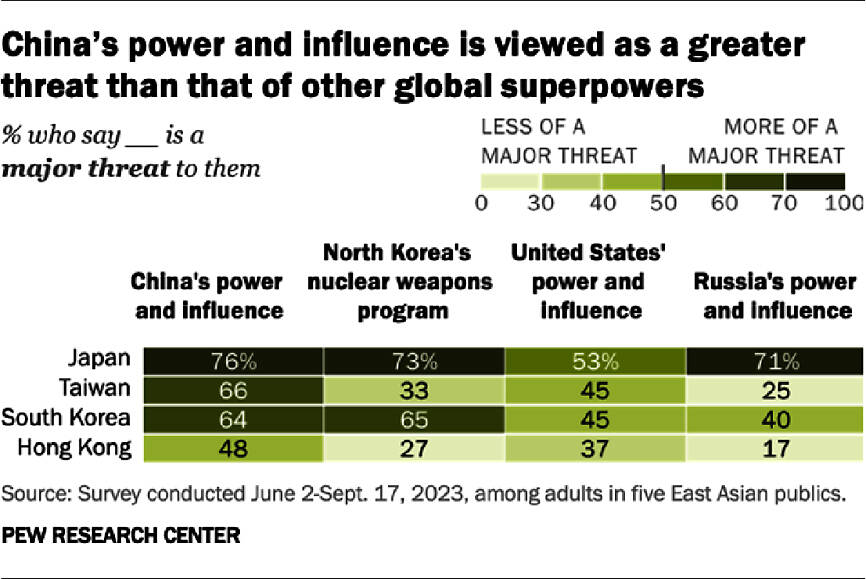Japanese are more likely to view China as a major threat than Taiwanese, although both sides agree that Beijing’s power and influence are the most concerning geopolitical hazard, a Pew Research Center poll showed on Tuesday.
From June 2 to Sept. 17, Pew researchers polled respondents in Taiwan, Japan, South Korea and Hong Kong on perceived threats posed by China, the US, Russia and North Korea.
China’s power and influence was considered the greatest threat above North Korea’s nuclear weapons program, or US or Russian influence, the report said.

Japanese respondents showed the most concern over China, with 76 percent calling it a “major threat” compared with 66 percent in Taiwan and 64 percent in South Korea, it said.
In Hong Kong the rate was 48 percent, with 29 percent not considering Chinese influence a threat, it said.
This year’s figure among Japanese is comparable to the 74 percent recorded during tensions in waters west of Japan in 2013, Pew said, but added that respondents in South Korea were less skeptical of China than they were a decade ago, when 76 percent said its influence posed a major threat.
Views of China’s threat level in Taiwan correlated with age and party affiliation, researchers said.
People younger than 35 in Taiwan and Hong Kong were more likely to say China as a major threat, the report said.
Supporters of the Democratic Progressive Party (DPP) were also more likely to think so at 78 percent than Chinese Nationalist Party (KMT) supporters at 59 percent, it said.
Japanese and South Korea respondents named North Korea’s nuclear weapons program as a major threat at rates of 73 and 65 percent respectively, while the figure was only 33 percent in Taiwan, it added.
In Japan, 71 percent of respondents named Russian influence as a major threat, while the figure was under half in the other regions, it said.
Only Japan had a majority who considered US power and influence to be a major threat at 53 percent, compared with 45 percent in Taiwan and South Korea, and 37 percent in Hong Kong, although 40 percent of Hong Kong respondents considered it a “minor threat,” the poll showed.
KMT supporters were more likely to view the US as a major threat at 63 percent, compared with 34 percent of DPP supporters, the report said.

ACTION PLAN: Taiwan would expand procurement from the US and encourage more companies to invest in the US to deepen bilateral cooperation, Lai said The government would not impose reciprocal tariffs in retaliation against US levies, President William Lai (賴清德) said yesterday, as he announced five strategies to address the issue, including pledging to increase Taiwanese companies’ investments in the US. Lai has in the past few days met with administrative and national security officials, as well as representatives from various industries, to explore countermeasures after US President Donald Trump on Wednesday last week announced a 32 percent duty on Taiwanese imports. In a video released yesterday evening, Lai said that Taiwan would not retaliate against the US with higher tariffs and Taiwanese companies’ commitments to

‘SPECIAL CHANNEL’: Taipei’s most important tasks are to stabilize industries affected by Trump’s trade tariffs and keep negotiations with Washington open, a source said National Security Council Secretary-General Joseph Wu (吳釗燮) arrived in the US for talks with US President Donald Trump’s administration, a source familiar with the matter said on Friday. Wu was leading a delegation for a meeting known as the “special channel,” the Financial Times reported earlier. It marked Trump’s first use of the channel since returning to the White House on Jan. 20. Citing a source familiar with the matter, the Financial Times reported that Minister of Foreign Affairs Lin Chia-lung (林佳龍) was also a part of the delegation. The visit came days after China concluded war games around Taiwan and amid Trump’s

CHIP EXCEPTION: An official said that an exception for Taiwanese semiconductors would have a limited effect, as most are packaged in third nations before being sold The Executive Yuan yesterday decried US President Donald Trump’s 32 percent tariff on Taiwanese goods announced hours earlier as “unfair,” saying it would lodge a representation with Washington. The Cabinet in a statement described the pledged US tariffs, expected to take effect on Wednesday next week, as “deeply unreasonable” and “highly regrettable.” Cabinet spokeswoman Michelle Lee (李慧芝) said that the government would “lodge a solemn representation” with the US Trade Representative and continue negotiating with Washington to “ensure the interests of our nation and industries.” Trump at a news conference in Washington on Wednesday announced a 10 percent baseline tariff on most goods

Intelligence agents have recorded 510,000 instances of “controversial information” being spread online by the Chinese Communist Party (CCP) so far this year, the National Security Bureau (NSB) said in a report yesterday, as it warned of artificial intelligence (AI) being employed to generate destabilizing misinformation. The bureau submitted a written report to the Legislative Yuan in preparation for National Security Bureau Director-General Tsai Ming-yen’s (蔡明彥) appearance before the Foreign Affairs and National Defense Committee today. The CCP has been using cognitive warfare to divide Taiwanese society by commenting on controversial issues such as Taiwan Semiconductor Manufacturing Co’s (TSMC, 台積電) investments in the